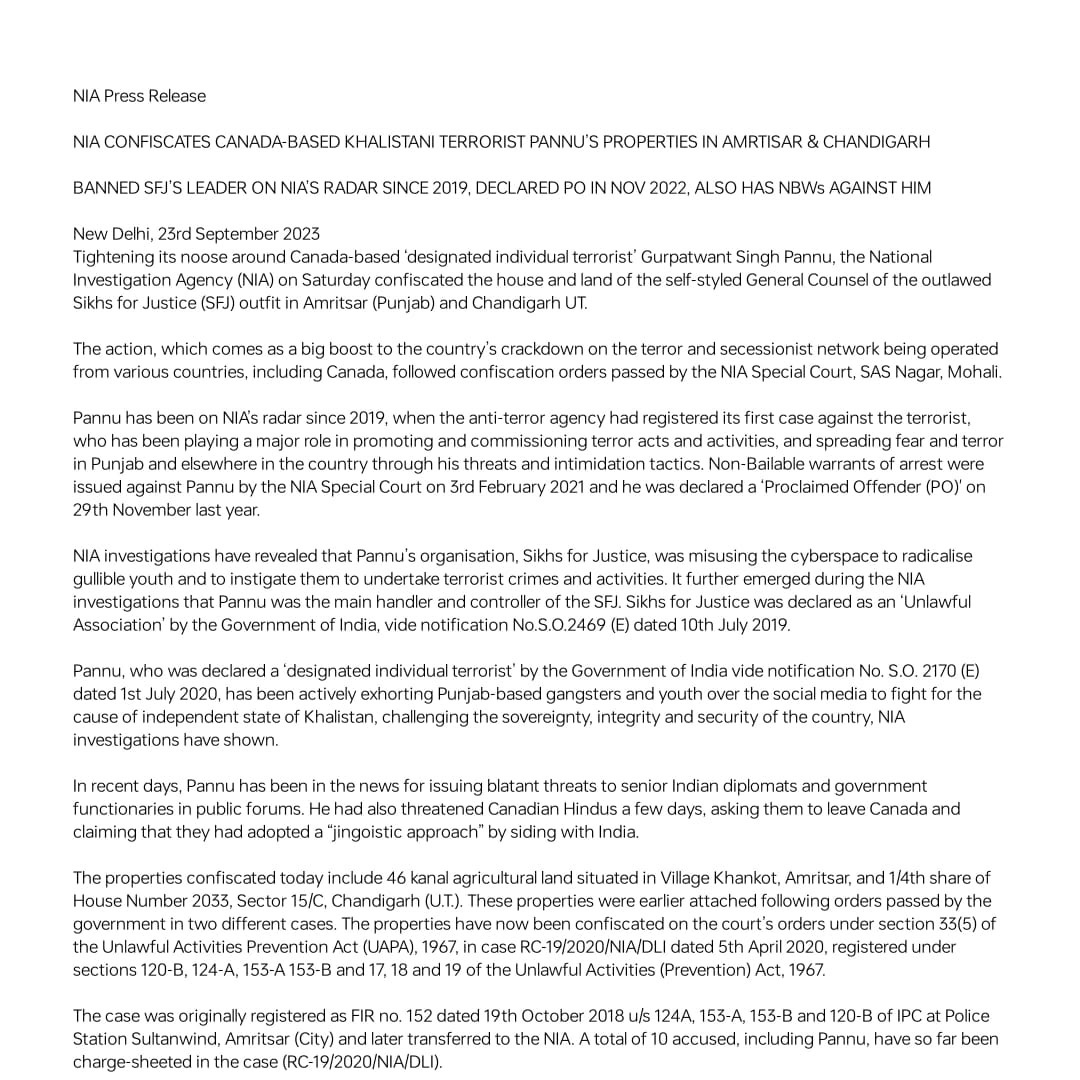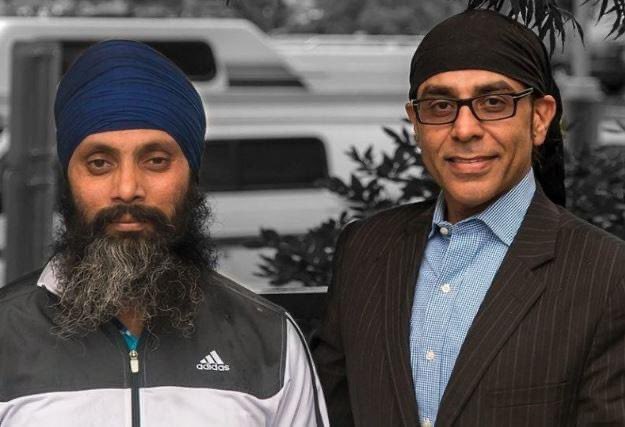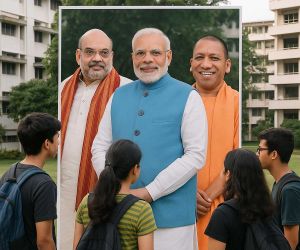MORE COVERAGE
Twitter Coverage
Satyaagrah
Written on
Satyaagrah
Written on
Satyaagrah
Written on
Satyaagrah
Written on
Satyaagrah
Written on
JOIN SATYAAGRAH SOCIAL MEDIA
"Nations stand tall when they stand firm": Amid soaring India-Canada tensions, India strikes a decisive blow against Khalistanis, seizing assets of Sikhs For Justice chief Gurpatwant Singh Pannun & Hardeep Singh Nijjar, reshaping geopolitical landscape

India stands strong and resilient, forever defending its honor and the safety of its people, both domestically and internationally. A prime example of a threat emerging from international borders is Gurpatwant Singh Pannun, the head of the prohibited group, Sikhs For Justice (SFJ). Pannun, shielded by the Canadian terrains, has audaciously threatened violent onslaughts against Indian missions situated in prominent Canadian cities, namely Ottawa, Toronto, and Vancouver.
|
His audacity doesn't stop at mere threats. Pannun has taken his hostility to another level, targeting Hindus residing in Canada. He has brazenly suggested that they should "return to India" as they allegedly remain devoted to their homeland. Adding to the absurdity of his claims, Pannun insists that he has more rights than native Canadians, even jestingly suggesting that the Canadian Prime Minister Justin Trudeau should fund a skin surgery for him to appear "whiter."
The bond between Pannun and Hardeep Singh Nijjhar, the latter being assassinated recently, is also hard to ignore. Referring to Nijjhar as his "brother", it's conspicuous that Pannun's increase in aggressive threats coincided with Trudeau's claims in the parliament associating India with the assassination. These threats didn't emerge right after the assassination in June but followed Trudeau's statements. This sequence of events raises eyebrows, prompting one to question if Trudeau's allegations provided an impetus for Pannun's renewed vigor against India.
Trudeau's usage of parliamentary privilege as a shield, especially when levying unverified claims even before the completion of Nijjhar's assassination investigation, treads a dangerous line. It could be perceived as a potential instigation. If, heaven forbid, an Indian diplomat becomes a target of violence in Canada, it is only justified for the Indian government, under the leadership of Prime Minister Modi, to escalate the matter to the International Court of Justice. Not just to ensure justice for the victim, but to also hold those responsible, including Trudeau if needed, accountable for inciting such heinous crimes.
India, a sovereign nation with its rich tapestry of history and diverse culture, is no stranger to external advice and, at times, unwarranted interference. The recent suggestion by the US for India to cooperate with the probe into Nijjhar's assassination is one such instance. However, it would be prudent for the US to redirect its concerns towards its close ally, Canada. The land of the maple leaf has been alleged to offer safe haven to Khalistani terrorists and criminals who not only unleash violence within India but also target Indians globally.
|
Drawing a parallel with the US's own actions post the traumatic 9/11 Twin Tower strikes, it becomes evident that when national pride and security are at stake, nations act decisively. The US's retaliation by invading Afghanistan and its orchestrated special operations to eliminate Osama Bin Laden in response to terror attacks on its soil serve as prime examples. Similarly, India reserves every right to respond to the tragic Air India flight Kanishka bombing, which claimed 329 innocent lives. The audacious calls for violence by Pannun, who flouts Canadian laws with impunity, further underscore India's right to defend its interests and safeguard its citizens.
The fabric of international relations is often interwoven with complex geopolitical dynamics. Bangladesh, for instance, has been vocal about Canada offering refuge to those involved in the assassination of Bangabandhu Sheikh Mujibur Rahman. Remarkably, a Canadian minister even rebuked the US for deporting one of the alleged culprits, Mohiuddin.
Interestingly, the dynamics of terror and its networks have their own way of retribution. The death of Khalistan Commando Force's key figure, Paramjit Singh Panjwar, in Lahore earlier this year saw a significant drop in Khalistani-backed disruptive activities in Punjab. Similarly, the demise of Babbar Khalsa's Ripudaman Singh Malik, the main suspect behind the 1985 Kanishka bombing, in Surrey last year speaks volumes. While both Pakistan and Canada lack evidence pointing towards Indian involvement, should India's agencies have had a hand in ensuring justice, they stand justified in their actions. Israel, renowned for its covert operations defending its national interests, serves as a benchmark in this regard. India, valuing its sovereignty and the safety of its citizens, is well within its rights to adopt similar measures in its quest for justice and self-defense.
|
The nuances of international relations often carry an undertone of strategic alliances and vested interests. With the rising influence of China on the global front, Western powers, including the US and UK, find themselves in a position where fostering strong ties with India is not merely beneficial, but rather imperative. As a nation, India stands at a juncture where it can redefine its terms of engagement, ensuring that partnerships are mutually beneficial and devoid of one-sided compromises.
However, the path to such mutually respectful relations has its share of obstacles. Canada's Prime Minister Justin Trudeau's recent actions underscore this sentiment. By reportedly curbing efforts from the Modi government to establish a dialogue with Khalistani groups based in Canada, Trudeau has hampered peace-building initiatives. The expulsion of Indian diplomat Pawan Kumar Rai, with his background in R&AW, seems to be an intentional move to thwart India's reconciliatory approach towards certain sections of the Sikh diaspora in Canada.
Such actions raise eyebrows and questions on Trudeau's motives. Are these maneuvers purely for appeasing a particular vote bank, or is there a larger international play at hand? His noticeable fuss at the G20 and declining PM Modi's generous offer point towards a seemingly deliberate antagonistic stance. Yet, beneath the surface, one must ponder if such behavior is fueled by the influence of other major Western powers like the US and UK. Both nations have had their share of allegations concerning harboring Khalistani extremists, often veiling their activities under the banner of freedom of speech and the rule of law.
|
The stakes are high. Should any harm befall Indian diplomats or missions in Canada due to these extremist ideologies, India has every right to respond with assertive measures, even if it involves targeting SFJ leader Pannun. The safety of Indian representatives abroad is paramount, and any threats to them are unacceptable. Canada's obligation to hand over Khalistani entities involved in violent activities in Punjab, especially those flagged by Interpol, remains non-negotiable.
If political considerations, such as Trudeau's alliance with the New Democratic Party led by Jagmeet Singh, are driving such divisive policies, perhaps a more straightforward solution exists. Maybe it's time for Canada to consider carving out a Khalistani province or autonomous state around Vancouver, allowing those with separatist ambitions a place to call their own.
|
Crackdown on Khalistanis: NIA confiscates properties of Gurpatwant Singh Pannun, notice issued to seize Hardeep Singh Nijjar’s property
In what appears to be a marked escalation in India's efforts to clamp down on Khalistani extremism, significant actions have been taken against key figures of the movement. Notably, the National Investigation Agency (NIA), on 23rd September, took decisive measures against Gurpatwant Singh Pannun and Hardeep Singh Nijjar, two prominent faces of the Khalistani narrative.
Gurpatwant Singh Pannun, known for his affiliations with the terror group Sikhs for Justice (SFJ), faced direct consequences as the NIA seized his property in Chandigarh's prestigious sector 15-C. The actions were undertaken following directives from a CBI-NIA Special Court located in Mohali. The NIA's assertion was evident as they put up a notice on Pannun’s property, which read, “1/4th share of house no. # 2033 sector 15-C, Chandigarh, owned by Gurpatwant Singh Pannu, a ‘proclaimed offender’ in NIA case RC-19/2020/NIA/DLI, stands confiscated to the state under section 33(5) of the Unlawful Activities Prevention Act, 1967 by orders of the NIA Special Court, Sas Nagar, Mohali, Punjab dated 14/09/2023. This is for information of general public.”
In tandem with the actions against Pannun, the NIA also targeted the property of Hardeep Singh Nijjar, a Khalistani terrorist who met his end in Canada earlier this June. A notice of property confiscation was displayed outside his residence in Bharsingh Pura village, Jalandhar district, cementing the Indian authorities' commitment to eradicating any symbols of Khalistani extremism within its borders. This action was also a direct consequence of the NIA Mohali court's order.
 |
| NIA CONFISCATES CANADA-BASED KHALISTANI TERRORIST PANNU’S PROPERTIES IN AMRTISAR & CHANDIGARH |
This latest set of actions underscores India’s unwavering resolve against extremist ideologies and movements that pose a threat to its sovereignty. It sends a clear message: Those who work against the nation's interests, irrespective of their location or influence, will face stringent consequences.
Following the determined crackdown on Khalistani extremism by Indian authorities, the National Investigation Agency (NIA) took further actions this week, intensifying the heat on pivotal figures, Gurpatwant Singh Pannun and Hardeep Singh Nijjar.
In a fresh wave of actions, Nijjar, a known Khalistani extremist, was served with a court notice, specifically mentioning his requirement to appear in court concerning an application filed by the NIA. The notice, meant to be delivered personally or through his close associates, read, “Hardeep Singh Nijjar @ Nijjar Son of Piara Singh, Resident of Village Bharsinghpura, PS Phillaur, District Jalandhar, Punjab... You are hereby directed to appear in this Court regarding the application U/S 33(5) of UA(P) Act filed by NIA to confiscate Immovable property belonging to Hardeep Singh Nijjar @ Nijjar on 11.09.2023 AT 10:00 A.M. Herein fall not.”
An official bulletin delineated the NIA’s approach to a special court, moving for the seizure of immovable properties associated with Pannun under the stringent provisions of the Unlawful Activities Prevention Act (UAPA), 1967.
Diving deeper into the specifics, an official told News18, “Pannun is accused in case RC-19/2020/NIA/DLI dated 05.04.2020 under sections 120-B, 124-A, 153-A 153-B and 17, 18 and 19 of Unlawful Activities (Prevention) Act, 1967. The case relates to funding of terrorist activities in Punjab from abroad, creating disharmony among communities and radicalising youth for terrorist activities.”
|
|
Pannun's confiscated properties span across Punjab and Chandigarh, including agricultural land in Village Khankot, Amritsar, and a significant share in a residence in Chandigarh's sector 15/C. Recognized as an “individual terrorist” under the UAPA, Pannun's activities have been under intense scrutiny, drawing the attention of multiple Indian agencies.
This rigorous course of action against such influential figures in the Khalistani narrative demonstrates India’s unwavering stance against extremism. With these decisive actions, the authorities are sending a crystal-clear message to all advocating anti-national sentiments: No matter the influence or reach, those who oppose India's interests will inevitably face the full might of the law.
The National Investigation Agency (NIA) seized the assets of Gurpatwant Singh Pannun, a key figure in the Khalistani narrative. This action is seen in the context of broader efforts to clamp down on secessionist elements aiming to destabilize the Indian state.
However, in an unexpected turn, Interpol rebuffed India's efforts to secure a Red Notice against Pannun last year. While the Central Bureau of Investigation (CBI), India’s primary liaison with Interpol, had forwarded the NIA's request, it was sent back, with Interpol seeking further clarifications.
|
This is even more significant, given that Sikhs for Justice (SFJ), the outfit associated with Pannun, was declared unlawful in 2019. Under the provisions of Section 3(1) of the Unlawful Activities (Prevention) Act, 1967, the SFJ was banned, citing its ties with extremist factions aiming for secessionist activities and inciting violence within India. Operating primarily from countries like the US, Canada, and the UK, the group has been instrumental in advancing the Khalistan agenda.
On 10 July 2019, the Indian government officially banned SFJ, reiterating its stance against any entities that compromise India's sovereignty. The notification from the government stated that SFJ's agenda was transparent – to create a separate sovereign nation in Punjab, which directly challenges the territorial integrity of India.
This renewed focus on Pannun and the actions against him are set against the backdrop of simmering tensions between India and Canada. The alleged assassination of Khalistani extremist Hardeep Singh Nijjar has become a sticking point, with Ottawa openly accusing New Delhi of involvement.
This series of events underscores the complexities of international diplomacy, especially when secessionist agendas intersect with national interests. India's unyielding stance against any form of extremism is evident, but how this plays out on the global stage, especially with key partners like Canada, remains to be seen.
 |
 Support Us
Support Us
Satyagraha was born from the heart of our land, with an undying aim to unveil the true essence of Bharat. It seeks to illuminate the hidden tales of our valiant freedom fighters and the rich chronicles that haven't yet sung their complete melody in the mainstream.
While platforms like NDTV and 'The Wire' effortlessly garner funds under the banner of safeguarding democracy, we at Satyagraha walk a different path. Our strength and resonance come from you. In this journey to weave a stronger Bharat, every little contribution amplifies our voice. Let's come together, contribute as you can, and champion the true spirit of our nation.
 |  |  |
| ICICI Bank of Satyaagrah | Razorpay Bank of Satyaagrah | PayPal Bank of Satyaagrah - For International Payments |
If all above doesn't work, then try the LINK below:
Please share the article on other platforms
DISCLAIMER: The author is solely responsible for the views expressed in this article. The author carries the responsibility for citing and/or licensing of images utilized within the text. The website also frequently uses non-commercial images for representational purposes only in line with the article. We are not responsible for the authenticity of such images. If some images have a copyright issue, we request the person/entity to contact us at This email address is being protected from spambots. You need JavaScript enabled to view it. and we will take the necessary actions to resolve the issue.
Related Articles
- "Face the future, say 'bring it on'": NIA lists 43 top criminals, including Canada-based with Khalistani ties, as tensions rise, Trudeau implicates India in Nijjar's Canada murder; India promptly refutes, calling the accusation 'absurd and motivated'
- "Life deals you a lot lessons, some people learn from it, some people don't": Notorious Khalistani terrorist & radical separatist Hardeep Singh Nijjar shot dead within the premises of the Guru Nanak Sikh Gurdwara Sahib in Surrey, British Columbia, Canada
- "From Father to Son: A Troubling Legacy": In a sinister echo of the past, Canadian PM Trudeau openly endorses Khalistani elements against India, uncovering the dark history of Pierre Trudeau shielding notorious Kanishka bombing mastermind Talwinder Parmar
- Sukhdool Singh, a notorious gangster listed by NIA assassinated in Canada, highlighting the growing web of Punjab's criminals overseas, as India's concerns rise, the spotlight turns to Canada's stance on sheltering such elements from Punjab's underworld
- NIA team of 3 members reaches Canada to investigate terrorist org SFJ, other pro-Khalistani groups and their foreign funding links
- India hits back, revealing a Canadian Border officer's role in aiding Khalistani terrorists and ISI in the murder of Sikh activist Balwinder Singh Sandhu, as Trudeau accuses Indian diplomats of killing terrorist Hardeep Singh Nijjar, escalating tensions
- "Turbulence tests the strength of community bonds": Hindu temple in Canada faces vandalism by Khalistan supporters, spotlighting escalating tensions after Khalistani activist Hardeep Singh Nijjar's death, What's next for the Hindu community abroad
- "Canada National Sport - The Blame Game": Indian High Commissioner challenges Canada's 'conviction' of India in Nijjar case, emphasizing the importance of a thorough & conclusive investigation before drawing conclusions in international diplomatic affairs
- "In the corridors of espionage, clarity is elusive": Sources shed light on Pakistan's ISI's alleged orchestration of terrorist Hardeep Nijjar's assassination in Canada, pointing to his resistance against supporting newly-arrived gangsters backed by ISI
- The untold exodus of 1.5 lakh Punjabi Hindus to Delhi’s Piragarhi camp; forced upon by Sikh radical Khalistani terrorists led by Bhindranwale
- Terrorist Organization SFJ chief Pannu threatens PM Modi and India after the security breach, says ‘Tiranga wale fled from Punjab’
- SFJ terrorist of radical Khalistani movement arrested in Germany due to Diplomatic pressure. Can Canada and UK be next?
- Amidst Trudeau's allegations against India, Sri Lanka condemns Canada's double standards, highlighting Ottawa's controversial recognition of a Nazi veteran and its past accusations of 'Tamil Genocide', Canada's international image is under severe scrutiny
- Pakistan’s ISI and Sikh For Justice has activated its terror outfits to derail the Punjab election, thinks it is ‘now or never’ opportunity for Khalistani Movement: Intelligence agencies issues warning
- "Separatist Goons": In a seismic disruption, pro-Khalistani elements heckle Indian Ambassador Taranjit Singh Sandhu after he was honoured at a Gurpurab event in a New York Gurdwara, uncover the explosive clash reshaping diplomatic narratives in USA

























